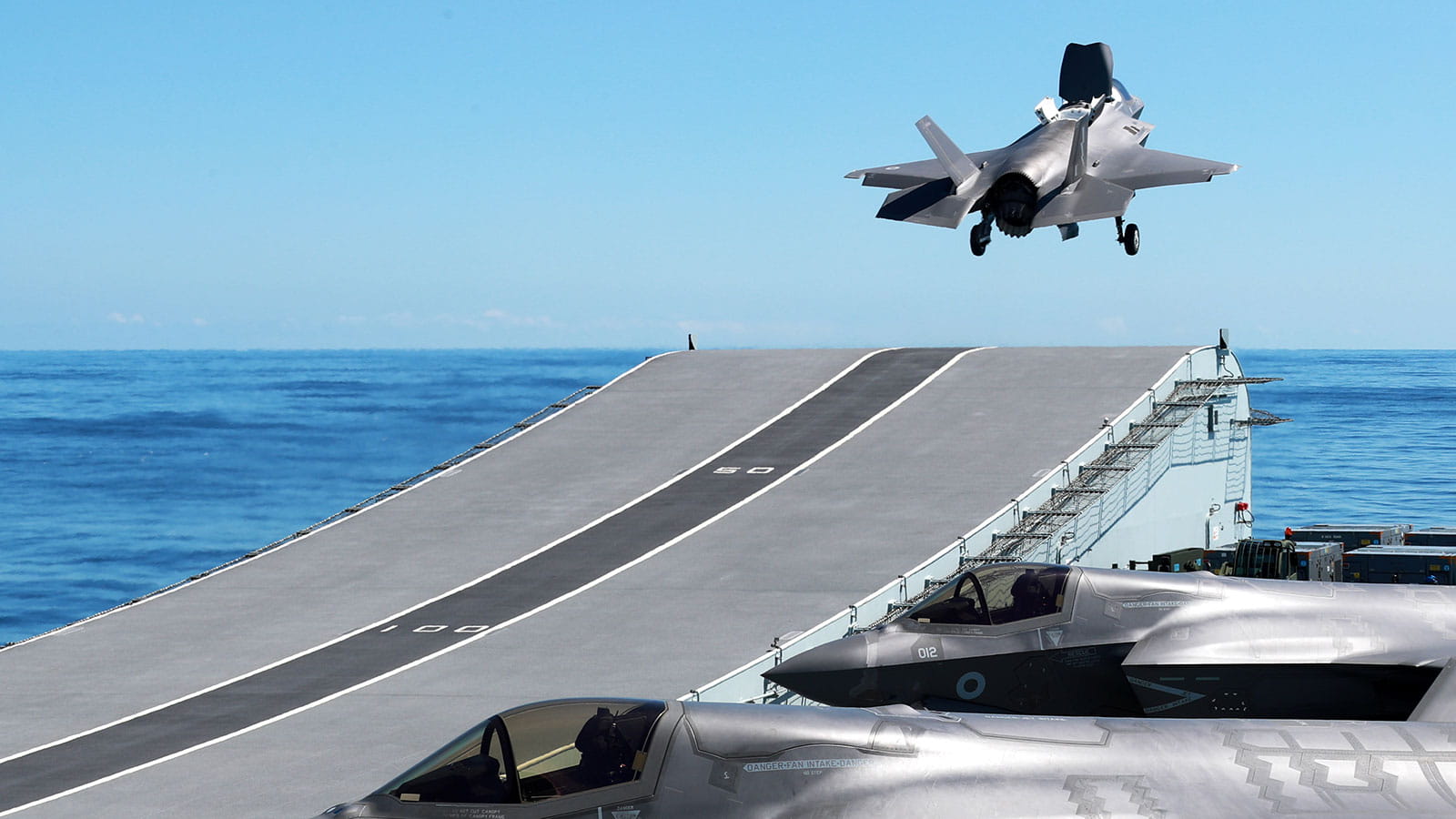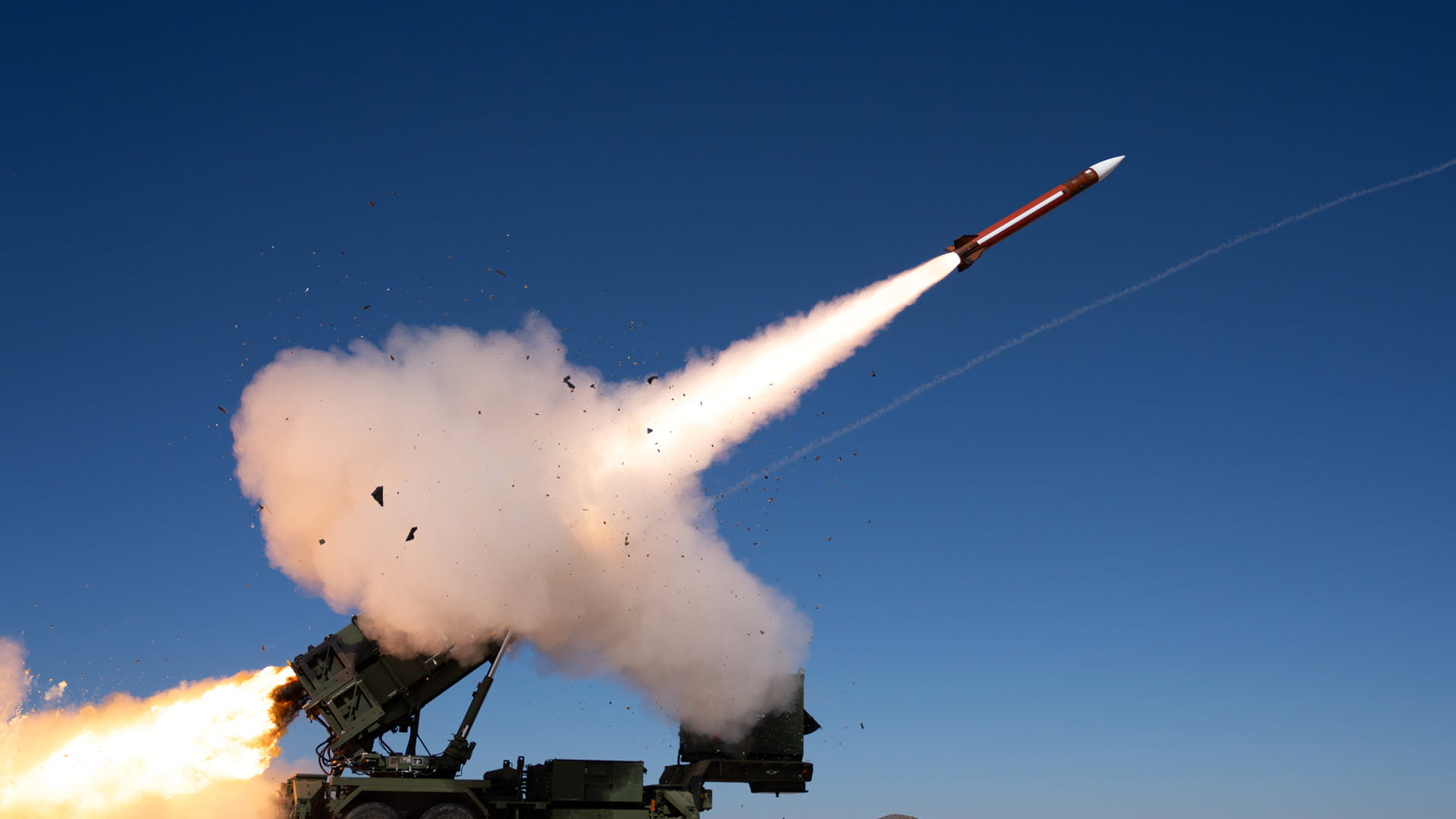Breeding prosperity, innovation and continued growth in the UK
In the U.K., creating and fielding new defence technology takes clear communication between the industry and government. That’s the approach of Raytheon Technologies, which uses a strong, collaborative dialogue with the U.K. government to inform the way the company innovates and meets the government's needs for building a strong talent pipeline, supporting exports and identifying new R&D initiatives.
“Because we have open lines of communication with the U.K. government, we’re aligned in terms of understanding what they’re trying to accomplish,” said Chris Lombardi, vice president for European government relations at Raytheon Technologies. “We firmly grasp what their defence and technology roadmaps look like and have a more informed strategy on how we can deliver that for them.”
This partnership results in growing prosperity for the U.K., as both parties continue to invest in one another. Raytheon Technologies’ U.K. operations, led by businesses Collins Aerospace, Pratt & Whitney, and Raytheon UK, directly employ about 7,000 people in high-quality jobs in the areas of aerospace, defence, cyber, and national security, and do business with approximately 4,000 U.K. suppliers in nine of the 10 parliamentary constituencies.
A recent Oxford Economics analysis demonstrates the company’s economic and social impact is felt far and wide. The study, based on 2019 data from Collins and Raytheon UK, estimates that for every 10 of the company’s 7,000 jobs, 42 additional jobs are sustained by the Raytheon Technologies U.K. supply chain. All told, that’s almost 36,000 jobs. With such a marked impact on the region, Raytheon Technologies is making a significant contribution to the economic growth and innovative impact of the U.K.
A steadily growing UK footprint
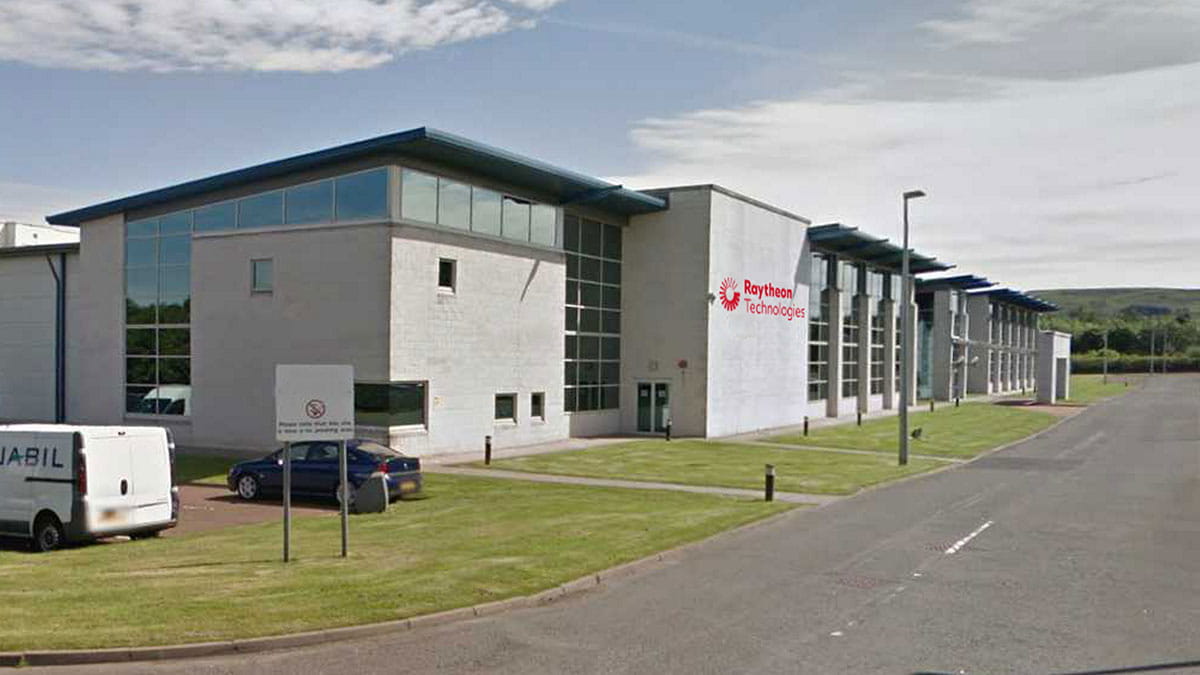
From semiconductor fabrication and complex mechanical assembly to space and power systems, digitalisation has been fundamental to the growth of Raytheon UK’s presence in Scotland since it started operations 60 years ago. Raytheon UK's Livingston facility (pictured) is its second in Scotland, furthering the business' enduring ties in the nation.
The businesses that now form Raytheon Technologies have been contributing to the U.K. economy for more than 100 years.
“Our engineers are generating unique IP in the U.K., which in turn, creates further growth,” said Christopher Hazeel, vice president of U.K. and northern Europe Customer & Account Management at Collins Aerospace, a Raytheon Technologies business. “It also gives us the opportunity to build on the country’s growing economy through a highly engaged industrial base in the U.K.”
In 2019, Raytheon Technologies contributed £2.7 billion to the U.K.’s gross domestic product, including the exportation of £2 billion in goods and services from the U.K. Oxford Economics estimates that Raytheon Technologies contributes 14 percent of the total gross value added (GVA) from the air and spacecraft manufacturing sector, illustrating the company’s sizable role in this industry’s sustainment and growth.
Stronger together on the defence front
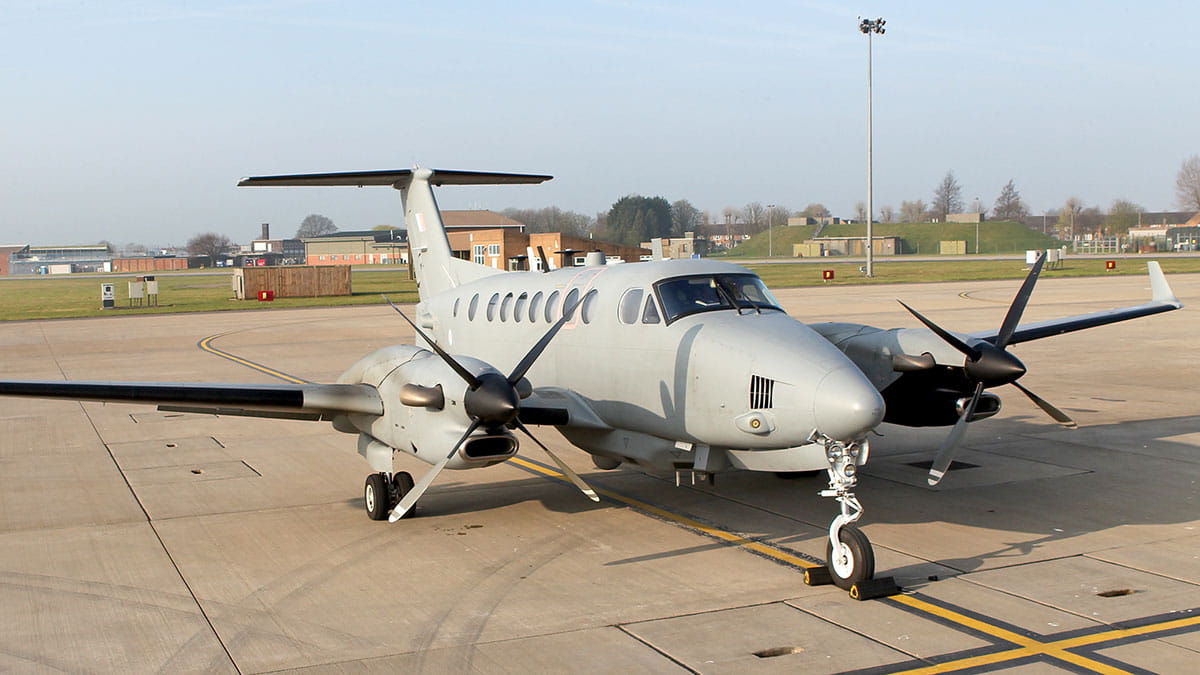
Raytheon UK’s airborne Intelligence Surveillance and Reconnaissance site in Broughton, North Wales, is a niche hub in technological innovation and integration of special mission aircraft, including the Shadow R1 tactical C4ISTAR solution for the U.K. Ministry of Defence. The system is integrated into a modified Beechcraft King Air 350ER aircraft (pictured).
Raytheon Technologies’ businesses bring defence industry expertise in many areas including engineering, government relations, export opportunities and infrastructure.
“Each branch of Raytheon Technologies is able to leverage their individual positions across all of those categories, which affords us a stronger posture in winning those opportunities,” said Jeff Lewis, chief executive and managing director for Raytheon UK.
With combined experience in areas including advanced data analytics, AI, cyber and the multi-domain battlespace, the company is well-suited to address key defence concerns for the U.K. military, Lombardi said.
“We tackle those threats through collaboration across our businesses and leverage those different areas of legacy experience in more strategic ways than we previously could,” he said.
A clear example of that collaboration is the company’s work on the F-35 fighter jet, which is part of the Royal Air Force and Royal Navy fleet. The U.K.’s F-35Bs, currently deployed aboard the HMS Queen Elizabeth with Carrier Strike Group 21, feature numerous components from across Raytheon Technologies. They include Pratt & Whitney’s F135 propulsion system, which gives the jet its short takeoff and vertical landing capability, and Collins Aerospace’s Joint Secure Air Combat Training System and Tactical Training Combat Systems.
Other Raytheon Technologies contributions to the F-35 include improved situational awareness in head-mounted displays with joint technologies from Collins Aerospace and Raytheon Intelligence & Space; precision weapons systems from Raytheon Missiles & Defense and Raytheon UK; the Raytheon Intelligence & Space Joint Precision Approach Landing System (JPALS), which enables precision landing in challenging settings like rugged terrain or rough seas; and the weapon bay door system and the simulator visual systems produced by Collins Aerospace in the U.K.
The U.K.’s defence industry plays a key role in the production and sustainment of the F-35. More than 100 U.K.-based suppliers make parts for the jet; U.K. industry will build about 15 percent of each F-35, generating significant export revenue and GDP growth while supporting more than 21,000 jobs across every region of the U.K.
Investing in the future of the UK workforce
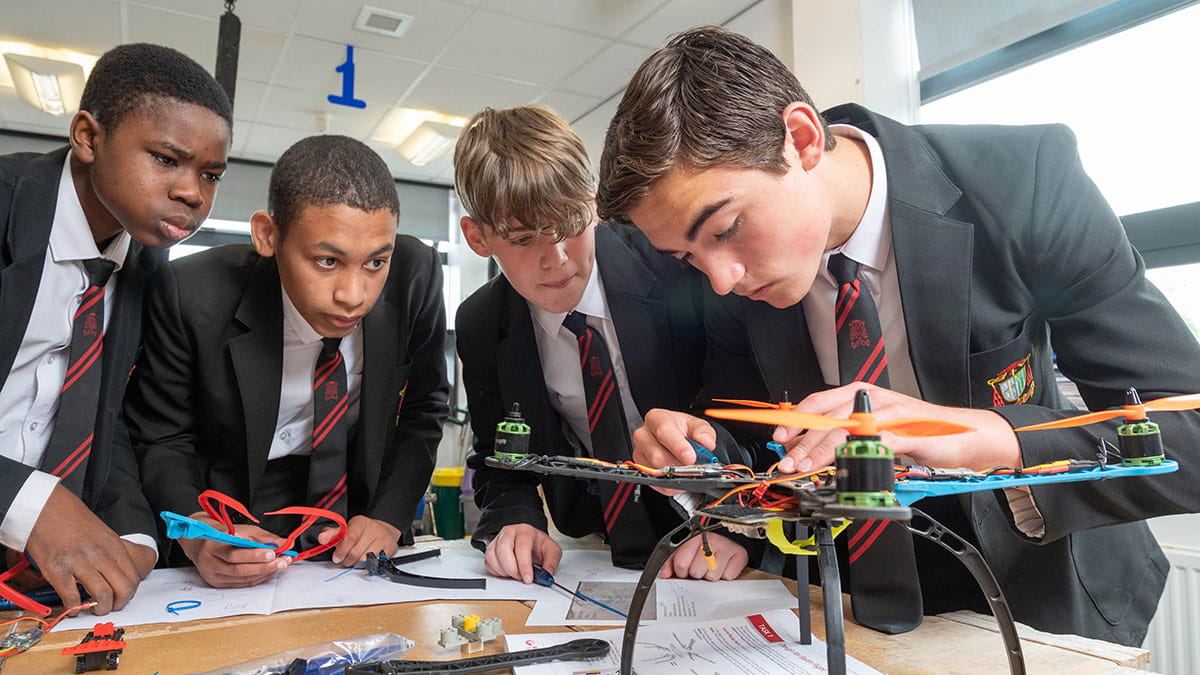
Students from Cardinal Langley RC High School in Greater Manchester work together on the design of their craft that won Raytheon Technologies 2021 Quadcopter Challenge. More than 30 schools and air cadet teams across England, Scotland and Wales, inspired by the successful use of a drone in NASA’s Ingenuity mission, competed in the contest, part of Raytheon Technologies’ efforts to promote STEM education.
Naturally, continuing the successful relationship with the U.K. government and defence forces requires continued growth across the company.
“Raytheon UK sees the opportunity to double in size over the next five years,” Lewis said. “We’re ambitious, but we’re well positioned to achieve that goal of creating prosperity with a global footprint through the right investment plans. We have developed a strong manufacturing base across the entire country, developing specialised and highly complex products. This includes our niche sites in Scotland, England and Wales, where we execute space-grade level manufacturing for customers around the world.”
Some of these investments take the shape of sponsorships for STEM education programs that encourage young people to engage with the field in stimulating and creative ways. Raytheon Technologies participates in the FIRST Technology Challenge, Introduce a Girl to Engineering and the Quadcopter Challenge, all of which promote an interest in STEM education among U.K. students.
“These programmes inspire the next generation of engineering leaders,” Lombardi said. “Our involvement, of course, benefits our company by helping cultivate a strong talent pool, but it also helps the country by supporting the students’ pursuit of high-quality jobs. We’re committed to investing in our nation’s future workforce.”

